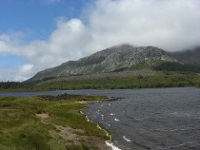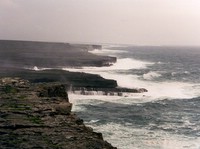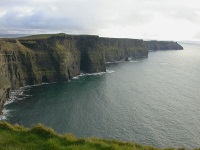Galway Travel Guide
Galway's stunning mix of ancient history and contemporary culture make it an essential stop for history buffs and nightlife enthusiasts alike. Its rich history as a medieval fishing village integrates seamlessly with its bustling bohemian atmosphere. There's plenty to see, and the Galway City Tour hop-on-hop-off bus provides an easy way for travellers to explore at their own pace. Old stone buildings and narrow alleyways bring the past to life, and it's also one of the last places where Gaelic is spoken in the streets.
The Galway City Museum offers an overview of the city's history, though the Galway Fisheries Watchtower Museum, the The Claddagh Ring Museum and Lynch's Castle cover the specifics. While the historical attractions in the city are extensive and impressive, Galway is also the beating heart of the West's arts scene. Students make up a quarter of the population, so it's unsurprising that Galway has become a multicultural haven for the arts.
The nightclubs in Eyre Square spill beats into the alleyways between the ancient remnants of medieval city walls. Quay Street is lined with brightly painted storefronts where visitors can kick back for some people-watching during the day. By night, it comes alive with music bars and restaurants. As dusk approaches, many enjoy strolling along the Salthill Promenade to watch the sunset over Galway Bay, with a Guinness and a platter of the bay's famous oysters. There's something going on year-round in Galway, but July visits during the famous International Arts Festival allow travellers to see the city in full swing.
Things to do in Galway

Connemara
Connemara is a wild and barren patchwork of bogs, green valleys, mountains and lakes. On the coast, visitors will find beautiful fishing villages and some superb white beaches washed by turquoise water. Mist and rain transform it into an eerie, magical place. The weather is very changeable and the light fluctuates almost constantly, bringing out the vivid colours of the various landscapes.
The Connemara National Park encompasses the remarkable granite peaks of the Twelve Bens and is wonderful walking country. Travellers could easily spend a whole Irish holiday in this amazing park. Its attractions include hiking, fishing, cycling, painting courses, horse riding, rock climbing, sailing, shooting, and golf at Connemara, among other things. There are also many historical sites and more cultural forms of entertainment, with traditional singing, music and dancing almost nightly, and some superb restaurants, pubs, bars and cafes. There are some wonderful camping facilities but also many upmarket guest houses, so the whole range of accommodation is catered for. Connemara is a must for nature lovers exploring Ireland.

Aran Islands
The Aran Islands, with their magnificent wild terrain, show years of wind and water erosion. The islands (Inishmore, Inishmaan and Inisheer) lie about 30 miles (48km) out across the mouth of Galway Bay and are criss-crossed by miles of stone walls. They're also dotted with some fine Iron Age archaeological sites. Ancient forts such as Dún Aengus on Inishmór Island, and Dún Chonchúir on Inishmaan Island, are some of the oldest archaeological remains in Ireland.
The islands were home to a number of ancient monasteries, and some clocháns (dry-stone beehive huts from the early-Christian period) can still be found. The islands' isolation allowed Irish culture to survive when it had all but disappeared elsewhere. Irish is still the native tongue and, until recently, people still wore traditional Aran dress. The women still knit the famous Aran sweaters, which are now popular souvenirs for visitors. Historically, each family used a different pattern in order to recognise fishermen drowned at sea. The islands are a haven for botanists and nature lovers because of their abundance of flora, fauna and nesting birds. Many people recognise the islands from the popular television show Father Ted, which was filmed there.

Cliffs of Moher
The steep and wondrous Cliffs of Moher overlook the Atlantic Ocean in County Clare, and are one of Ireland's top visitor sights. The majestic cliffs rise from the ocean to a height of 702ft (214m) and extend for a distance of five miles (8km). Formed by layers of sandstone, shale and siltstone, the cliffs have stood unchanged for millions of years. Visitors come to marvel at their splendour, and to enjoy views towards the Aran Islands in Galway Bay, as well as the valleys and hills of Connemara. If at all possible, travellers should visit the cliffs on a clear day to fully appreciate the views and natural beauty. On misty or rainy days, it's impossible see the ocean far below, and the wind on the cliff-tops can be terrifyingly strong.
The award-winning visitor centre offers an ultra-modern interpretive centre, Atlantic Edge, which includes interactive exhibits and displays, images, an audio visual show, and a virtual reality cliff-face adventure. Travellers can quite easily approach the cliffs without visiting the centre, but learning a bit about the place enriches the experience.
Nightlife
The nightlife in Galway is renowned, offering a vast selection of pubs, bars and nightclubs to choose from. It is a student city, which makes every night feel like a Saturday. There is always something going on.
There are great traditional music sessions held at the Crane Bar on Sea Road, Taaffes and Tigh Chóilí on Shop Street, and Western Bar near Eyre Square. The smaller country pubs just out of town are also very popular and a great way to experience true Irish culture. On any given night there will be wonderful folk music on offer in Galway and as you wander down the cobbled streets you will be drawn into the pubs and bars by the jolly live music. The legal drinking age is 18 and most nightclubs open at 11pm, closing round 2.30am. There is usually a cover charge at the door but free/reduced admission stamps are often handed out on Shop Street. A few trendy bars stay open till the early hours, including the Front Door on the corner of High and Cross streets and the Quays (which also has a club with live music) on Quay Street. Other good clubs are Halo, Carbon and Karma.
Ireland travel info
Electricity
Electrical current is 230 volts, 50Hz. UK-style three-pin and round three-pin plugs are in use.
Language
English is the principal language, although a minority of people speak Irish (Gaelic).
Money
The unit of currency is the Euro (EUR). Currency can be exchanged at banks and bureaux de change, and ATMs are widely available. Credit and debit cards are widely accepted.
Tipping
A 10 percent tip will be welcomed in restaurants and cafes, and occasionally a service charge will be added to the bill. Tipping is not usual in bars and pubs, or for other services.
Health
There are no special health requirements for visitors, though all eligible travellers should be up to date with their COVID-19 vaccines. A European Health Insurance Card (EHIC) should be obtained before departing for Ireland. After Brexit, the Global Health Insurance Card (GHIC) replaced the European Health Insurance Card (EHIC) for UK citizens. The GHIC allows UK citizens access to state healthcare during visits to the EU. The GHIC is not valid in Norway, Iceland, Liechtenstein or Switzerland, nor is it an alternative to travel insurance. Medical facilities are good and medicines are widely available; if travellers require specific medication, it is always advised that they bring it with them. Travellers should make sure to carry all medications in their original containers, clearly labeled. They should also have a signed, dated letter from their doctor describing all medical conditions and listing all prescribed medications, including generic names.
Safety
Most visitors to Ireland enjoy a fairly high level of personal safety. Ireland has a very low level of violent crime, but there is a high incidence of petty theft in tourist areas and foreigners are targeted by pick-pockets. Travellers should take sensible precautions against petty theft, including duplicating important documents, carrying valuables in separate bags or pockets, and leaving valuables in hotel safes whenever possible. Terrorism is no more a threat in Ireland than in other Western countries and safety in the country has improved significantly with peace in Northern Ireland. Those travelling into Northern Ireland should note that the safety alerts for that country are completely seperate and can be found in the United Kingdom travel guide.
Local customs
The Irish are warm and welcoming and their conversation is often light hearted and dosed with humour, irreverence and self-depreciation. A handshake is the normal form of greeting, though close friends will hug or kiss each other on the cheek. The pub remains at the centre of many communities, and alcohol may be bought by anyone over 18 years old. Smoking is not allowed in public spaces, including in pubs and restaurants. Visitors should refrain from forcing discussions of political and religious differences and show respect if the topics are brought up. Attitudes towards LGBT people are liberal and same-sex marriage is legal.
Doing business
The Irish are very sociable and, although the usual elements of business etiquette apply (punctuality, formal wear, a courteous manner), foreigners can expect good conversation and a rather relaxed air. Handshakes are customary on introduction, and foreigners should take the lead from the host with regards to using first names or surnames. Business hours are usually from 9am to 5.30pm Monday to Friday, with a lunch break from 1pm to 2pm.
Duty free
Travellers over 17 years old arriving from non-EU countries do not have to pay duty on most products. Regulations allow 200 cigarettes, 100 cigarillos, 50 cigars, 250g tobacco; one litre of spirits with more than 22 percent alcohol volume, two litres of dessert wine, port of sherry with a maximum 22 percent alcohol content; and four litres of wine or 16 litres of beer. Other duty free products include perfume up to 50g or 250ml eau de toilette; and other goods for personal consumption to the value of €430 per adult or €215 for children under 15 years.
Communications
The international access code for Ireland is +353. Hotels, cafes and restaurants offering free WiFi are widely available; purchasing a local prepaid SIM card can be a cheaper option than accepting international roaming costs, which can be high.
Passport & Visa
All foreign passengers to Ireland must be able to show proof of sufficient funds to cover their stay in the country. Passengers should also hold return or onward tickets, and the necessary travel documentation for their next destination, as immigration officers might demand that they demonstrate proof of their intention to leave Ireland. If the traveller's passport bears a British inadmissable stamp, unless the immigration officer is convinced that they will not travel on to the United Kingdom, entry may be refused to Ireland. It is highly recommended that travellers' passport have at least six months' validity remaining after the intended date of departure from their travel destination. Immigration officials often apply different rules to those stated by travel agents and official sources.
Entry requirements
US citizens must have a passport that is valid for the period of intended stay in Ireland. No visa required for 90 days.
British citizens must have a passport that is valid upon their arrival in Ireland. Passport exemptions apply to holders of proof of nationality issued to nationals of Ireland and British subjects, for travel between Ireland and Great Britain and Northern Ireland only. No visa is required for holders of British passports endorsed British Citizen, British National (Overseas), or British Overseas Territories Citizen.
Canadian citizens must have a passport that is valid for the period of intended stay in Ireland. No visa is required for 90 days.
Australian citizens must have a passport that is valid for the period of intended stay in Ireland. No visa is required for 90 days.
South African citizens must have a passport that is valid for the period of intended stay in Ireland. No visa is required for 90 days.
New Zealand citizens must have a passport that is valid for the period of intended stay in Ireland. No visa is required 90 days.
Useful contacts
Irish Tourist Office, Dublin: www.ireland.com
112 (general emergencies)Embassies / consulates in other countries
Irish Embassy, Washington DC, United States: +1 202 462 3939.
Irish Embassy, London, United Kingdom: +44 (0)20 7235 2171.
Irish Embassy, Ottawa, Canada: +1 613 233 6281.
Irish Embassy, Canberra, Australia: +61 (0)2 6214 0000.
Irish Embassy, Pretoria, South Africa: +27 (0)12 452 1000.
Consulate-General of Ireland, Auckland, New Zealand: +64 (0)9 977 2252.
Embassies / consulates in Ireland
United States Embassy, Dublin: +353 (0)1 668 8777.
British Embassy, Dublin: +353 (0)1 205 3700.
Canadian Embassy, Dublin: +353 (0)1 234 4000.
Australian Embassy, Dublin: +353 (0)1 664 5300.
South African Embassy, Dublin: +353 (0)1 661 5553.
New Zealand High Commission, London, United Kingdom (also responsible for Ireland): +44 (0)20 7930 8422.



